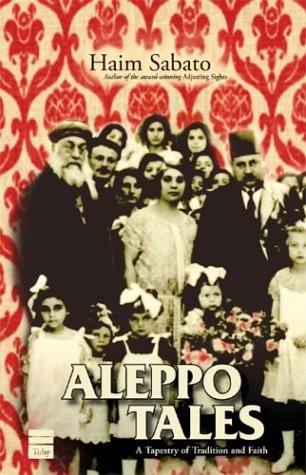Aleppo Tales
Haim Sabato, “a master of Hebrew ancient and modern” today heads a yeshiva near Jerusalem. In Aleppo Tales he presents more a collection of loosely connected vignettes remembering his ancestors than a novel in this translation. His ancestors since time immemorial had been leading scholars in the ancient Jewish community of Aleppo, Syria, which the Jews called Aram Zova. These tales have very little to do with fountains and courtyards and streets of this lost world; world wars and the fashions of French political movements come and go. Even conflicts with their Muslim neighbors hardly brushed upon. For the thousands of years Jews lived there, Syria seems hardly to have affected the people. Theirs, instead, is the existence of the mind, of Torah, of days and nights spent pouring over the exegesis of Rambam or the mysteries of the Shulhan Aruch. The greatest triumph is to answer a thorny talmudic question while measuring out fabrics in one’s little shop, life’s great ambition to publish a treatise, the greatest tragedy when, having just completed his crowning glory, a man reaches for the ink pot instead of the sand to sprinkle over the pages. The big events happen, as the author writes, “between the silent prayer and the repetition of the Mussaf,” the slightest changes in liturgy to be battled over for generations. If this is your “Kaddish cup,” this book is for you. The lengthy glossary provided is necessary for the uninitiated.
This world has disappeared, ironically with the immigration of the family to Israel. In the camp of immigrants, Moroccans, Rumanians, Aleppans live cheek by jowl, incapable of embracing one another’s traditional ways. Men who were once the revered sages of their exiled communities, judges and scholars, must spend their days digging ditches or planting trees in Eretz Israel like everyone else and can hardly raise a minyan to pray when they die.










